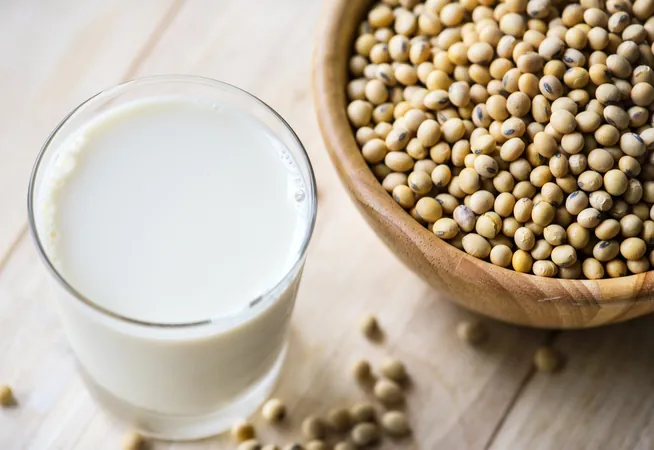
Gobbling Meat: The Surprising Link to the Climate Crisis and How to Reduce Your Footprint!
2024-11-28
Author: Rajesh
Gobbling Meat: The Surprising Link to the Climate Crisis and How to Reduce Your Footprint!
As Americans gather around their Thanksgiving tables, many will indulge in the traditional centerpiece: roast turkey. However, the idea of celebrating with a meat-based dish transcends just one holiday—it's a ritual that recurs during Christmas, Easter, Eid al-Fitr, Passover, and Lunar New Year, illustrating how deeply embedded meat is within our traditions.
Emma Garnett, a researcher at the University of Oxford, observes that "meat is intimately tied with a lot of traditions and festivities." Yet, Garnett points out that meat consumption, particularly in developed countries, far exceeds recommended dietary guidelines. This excess not only jeopardizes public health but is also a significant contributor to environmental degradation. "Food systems account for a massive one-third of global greenhouse gas emissions," notes Stacy Blondin of the World Resources Institute, emphasizing that animal-based food production is a major culprit.
Ruminant animals, such as cows, are particularly notorious for their methane emissions—a potent greenhouse gas—resulting from their unique digestive processes. To put this in perspective, the environmental impact of beef is approximately twenty times greater than that of plant-based protein sources like beans and legumes. Transitioning the global diet towards more plant-based options could lead to a significant reduction in greenhouse gases, with studies suggesting that a shift to predominantly plant-based foods could decrease current dietary emissions by 17% compared to 2019 levels.
However, changing entrenched eating habits is no small feat. People's identities and emotions are often tied to their dietary choices, and there can be negative perceptions surrounding reduced meat consumption. Unfortunately, misinformation also abounds—some believe plant-based diets are inadequate for protein intake or that soy poses health risks for men.
Despite these challenges, various innovative strategies are being employed to encourage greener eating habits.
1. Promote Plant-Based Options:
Enhancing the visibility and marketing of plant-based meals can significantly influence consumer choices. A coalition of institutions known as the Menus of Change University Research Collaborative has recorded a 23% reduction in greenhouse gas emissions per kilogram of food purchased over four years by prioritizing plant-forward meals. Aiming for a further 40% reduction by 2030, some restaurants are placing plant-based options at the forefront of their menus.
2. Implement Meat-Free Days:
Campaigns like Veganuary, promoting a month-long vegan commitment each January, have gained popularity, with participants often reporting lasting changes in their dietary habits. Research indicates that initiatives like "Meat-Free Monday" can lead many participants to transition to vegetarian or vegan diets long-term.
3. Blending Techniques:
Another successful strategy involves blending meat with vegetables in products like burgers and meatballs. Experimental studies suggest that diners often find these blended options just as appealing, allowing for a gradual reduction in meat consumption while still enjoying meat-flavored dishes.
4. Elevate Plant-Based Culinary Experiences:
Aiming to make plant-based meals tastier, Denmark has launched a $100 million initiative to enhance the availability of delicious vegetarian cuisine. Similarly, in the U.S., culinary organizations are focusing on developing recipes and techniques that combine flavors to elevate plant-forward dining experiences.
Ultimately, as Stacy Blondin aptly states, "If the food doesn’t taste good, no amount of promotion will make people want to eat it." By making plant-based options flavorful and appealing, society can make significant strides toward more sustainable eating habits.
As the global climate crisis intensifies, rethinking our relationship with meat and embracing plant-forward diets is not just an individual choice but a collective necessity. The next time you sit down for a meal, consider the impact of your choices—not just on your health, but on the health of our planet. Together, we can carve a path to a more sustainable future, one plate at a time!



 Brasil (PT)
Brasil (PT)
 Canada (EN)
Canada (EN)
 Chile (ES)
Chile (ES)
 España (ES)
España (ES)
 France (FR)
France (FR)
 Hong Kong (EN)
Hong Kong (EN)
 Italia (IT)
Italia (IT)
 日本 (JA)
日本 (JA)
 Magyarország (HU)
Magyarország (HU)
 Norge (NO)
Norge (NO)
 Polska (PL)
Polska (PL)
 Schweiz (DE)
Schweiz (DE)
 Singapore (EN)
Singapore (EN)
 Sverige (SV)
Sverige (SV)
 Suomi (FI)
Suomi (FI)
 Türkiye (TR)
Türkiye (TR)